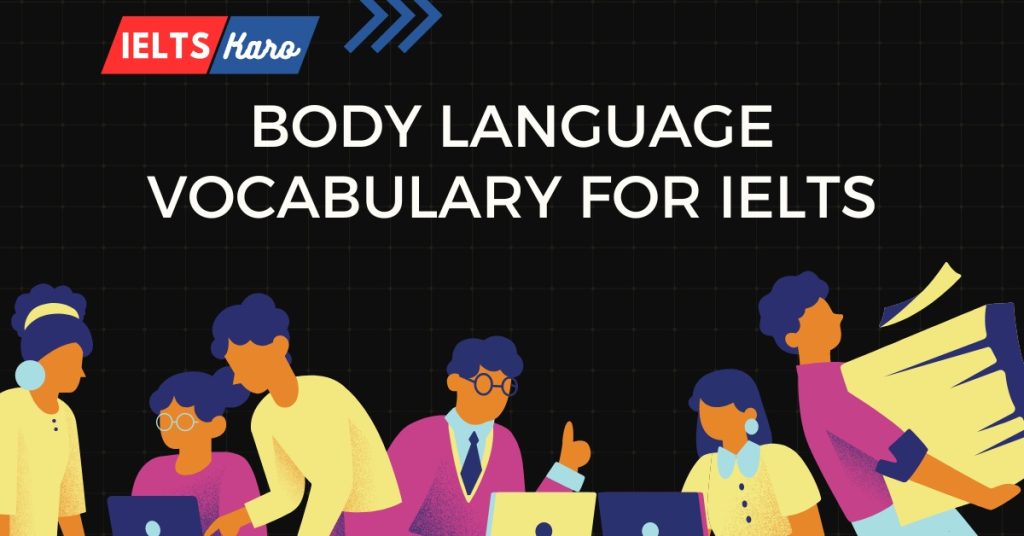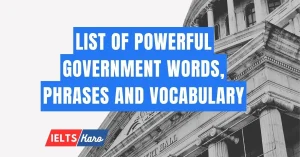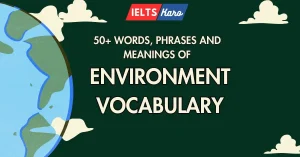Mastering the Silent Language: A Guide to Body Language Vocabulary for your IELTS Exam
Body language, the unspoken communication of gestures, facial expressions, posture, and eye contact, plays a crucial role in everyday interaction. Understanding and effectively using body language vocabulary can significantly enhance your score in the IELTS speaking and writing sections.
This blog post will equip you with essential body language vocabulary, including examples, meanings, and sentence structures, to help you effectively describe and analsze non-verbal communication in your IELTS exam.
Words with Meanings – Definition and Examples
Facial Expressions:
- Smiling: A universally understood expression indicating happiness, friendliness, or amusement
The interviewee’s warm smile immediately put me at ease, creating a more relaxed atmosphere for the conversation.
- Frowning: Signaling disapproval, annoyance, or concentration.
The teacher frowned upon the student who continued talking after being told to stop.
- Raised eyebrows: Expressing surprise, disbelief, or questioning.
She raised her eyebrows in astonishment when I told her the news.
- Pursed lips: Can indicate disapproval, frustration, or deep thought.
The manager pursed his lips as he reviewed the disappointing sales figures.
Posture:
- Slouching: May suggest boredom, disinterest, or lack of confidence.
The student slumped in his chair, his posture mirroring the monotonous tone of the lecture and reflecting his disengagement with the material.
- Standing tall with shoulders back: Projects confidence, power, and authority.
The CEO stood tall with her shoulders back, exuding confidence during her presentation.
- Crossed arms: Can be a defensive posture, indicating disagreement or a desire for personal space.
The customer crossed his arms as the salesperson continued his pitch, seemingly unconvinced by the product’s features.
Gestures:
- Nodding: Signaling agreement, understanding, or encouragement.
The audience nodded enthusiastically as the speaker delivered his inspiring message. Their body language communicated their approval and resonated with the speaker’s points.
- Shaking head: Expressing disagreement, disapproval, or negation.
She shook her head firmly when I suggested postponing the meeting.
- Pointing: A direct way to indicate something or someone.
The tour guide pointed towards the historical monument with a flourish, explaining its significance to the captivated audience.
- Open palms: Signaling honesty, openness, or receptiveness.
The police officer raised his open palms in a calming gesture as he approached the agitated crowd.
Eye Contact:
- Making direct eye contact: Shows confidence, interest, and attentiveness.
During the interview, I maintained eye contact with the interviewer to demonstrate my sincerity and engagement with the conversation.
- Avoiding eye contact: May indicate shyness, nervousness, or dishonesty.
The suspect kept avoiding eye contact, which made me suspicious of his involvement in the crime.
Using Body Language Vocabulary in a Sentence:
- “While the politician delivered a passionate speech, his nervous fidgeting with his tie betrayed his anxiety about the upcoming election results.”
- “The manager’s steepled fingers and pursed lips suggested he was deeply considering my proposal, carefully weighing the potential risks and rewards before making a decision.”
- “Despite her warm smile, her crossed arms indicated she wasn’t entirely convinced by my arguments. Her body language revealed a disconnect between her verbal and non-verbal communication, creating a hint of skepticism.”
Tips for Using Body Language Vocabulary in IELTS:
- Focus on specific details: Don’t just say “happy”; describe the facial expression (e.g., “wide smile”).
- Use linking verbs: Connect body language to emotions or actions (e.g., “He slumped in his chair
- Use synonyms: Expand your vocabulary beyond basic terms (e.g., instead of “happy,” use “elated” or “content”).
- Analyse the impact: Explain how body language affects communication (e.g., “The speaker’s enthusiastic gestures helped to keep the audience engaged”).
- Combine with other elements: Integrate body language with tone of voice and facial expressions for a holistic picture (e.g., “His firm tone and direct eye contact, coupled with a clenched jaw, conveyed a sense of determination”).
Example Questions and Responses – Speaking Part 1
Do you believe that body language is important in communication?
Yes. Non-verbal communication constitutes a major portion of your communication and not showing expressions will not add any meaning or power to your words.
Can you tell if someone is nervous or happy by their body language?
I have experience of dealing with different types of people. Within a short period of time, I can immediately tell if the person I am speaking with, is hesitant, or interested in the conversation by their body language.
Have you ever misinterpreted someone’s body language?
Oh yes! That has happened a few times. I accidentally misinterpreted as my friend’s body language has uninterested, whereas he was showing interest in my conversation.
Example Questions and Responses – Speaking Part 2
Describe a time when body language helped you understand someone better.
You should say:
- When and where it happened
- Who the person was
- What body language the person used
- And explain how you felt about understanding the person better through their body language.
It wasn’t long ago. I remember a few weeks back, I went to meet a client. Since I run a digital marketing agency, I often to have to meet references and new clients to discuss their business goals and provide them with the right solutions.
This person happened to be my friend’s acquaintance, and was interested in knowing more about how my services could solve his problems. As I was discussing about my services, I noticed that he did not maintain eye contact, and neither did he show any clear expressions on his face. I immediately understood that since I was giving presentation about my business, he was not interested in knowing everything.
He had his arms crossed and instead of leaning forward, he sat with a relaxed attitude clearly giving me the vibe that we wasn’t interested in what I said. That’s when I realized that I need to speed up the presentation and move to the point where I would talk about his business problems and how I can solve them.
That’s when he started showing interest by leaning forward, having a curiousity on his face by asking some questions about the topics. His face lit up and he showed various emotions as my presentation was more focused on his business. At some point, he interrupted me and asked additional questions, which clearly showed his engagment in the conversation.
Hence, it clearly shows the importance of body language in communication. If the body language is not right, no matter what, the conversation will not end fruitful.
Conclusion:
By mastering body language vocabulary, you’ll gain a deeper understanding of human interaction and enhance your ability to communicate effectively in the IELTS exam. Practice describing body language in your everyday conversations and writing exercises. This will not only improve your overall communication skills but also significantly boost your score in the IELTS speaking and writing sections.
To know more about this topic, here is a great resource no how to understand body language effectively.
Remember, body language is a powerful tool. Learn to read it, use it effectively, and impress the IELTS examiner with your nuanced understanding of non-verbal communication.





